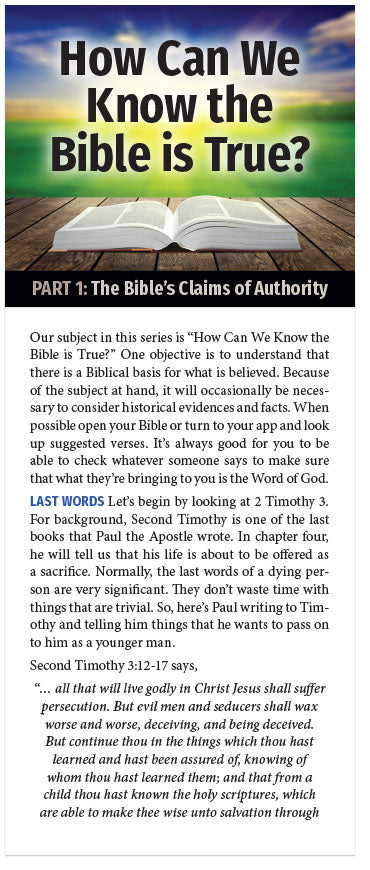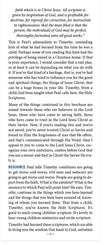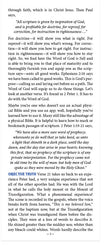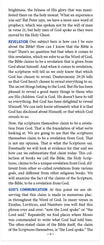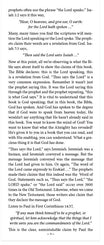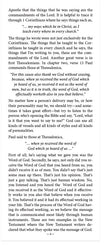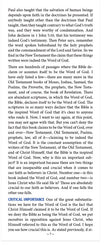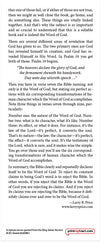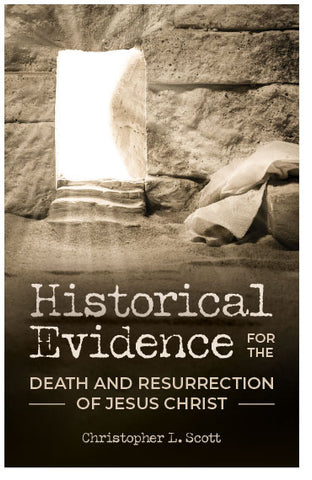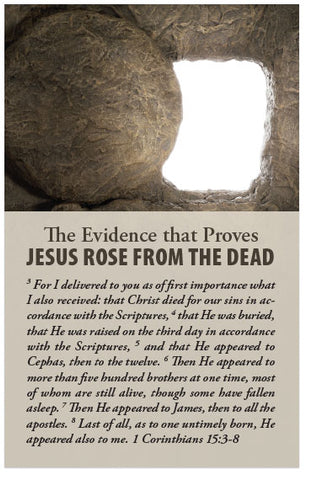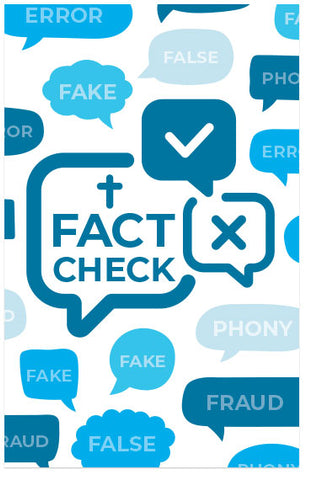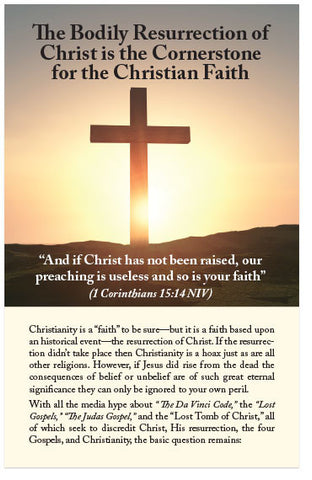How Can We Know The Bible Is True? (Part 1 of 5)
Special-Order Folded Flyer Tract
 NOTE: This item is custom-printed to order (click for more details).
NOTE: This item is custom-printed to order (click for more details).
This tract is from our print-on-demand library, and is not kept in stock. Select the options below, and we will custom-print a batch just for you. Because this item is custom-printed, you can add your custom imprint to the back page at no extra cost.
- Estimated shipping date: Wednesday, March 18 (Click for more details)
- SKU:
- Discounts: Discount coupons do not apply to this item
- Format: Folded Flyer Tract
- Size: 3.5 inches x 8.5 inches
- Pages: 8
- Imprinting: Available with 3 lines of custom text
- Version: KJV
- Returns: Because this item is custom-printed to order, it cannot be returned.
Show all item details
The full text of this flyer tract is shown below in the KJV version. (Do you want to print this tract in a different version than the one listed? Contact us and let us know what you're looking for—we may be able to create the alternate version for you at no charge.)
Our subject in this series is “How Can We Know the Bible is True?” One objective is to understand that there is a Biblical basis for what is believed. Because of the subject at hand, it will occasionally be necessary to consider historical evidences and facts. When possible open your Bible or turn to your app and look up suggested verses. It’s always good for you to be able to check whatever someone says to make sure that what they’re bringing to you is the Word of God.
Last Words Let’s begin by looking at 2 Timothy 3. For background, Second Timothy is one of the last books that Paul the Apostle wrote. In chapter four, he will tell us that his life is about to be offered as a sacrifice. Normally, the last words of a dying person are very significant. They don’t waste time with things that are trivial. So, here’s Paul writing to Timothy and telling him things that he wants to pass on to him as a younger man.
Second Timothy 3:12-17 says,
“… all that will live godly in Christ Jesus shall suffer persecution. But evil men and seducers shall wax worse and worse, deceiving, and being deceived. But continue thou in the things which thou hast learned and hast been assured of, knowing of whom thou hast learned them; and that from a child thou hast known the holy scriptures, which are able to make thee wise unto salvation through faith which is in Christ Jesus. All scripture is given by inspiration of God, and is profitable for doctrine, for reproof, for correction, for instruction in righteousness: that the man [that is that the person, the individual] of God may be perfect, thoroughly furnished unto all good works.”
This is Paul’s admonition to Timothy, reminding him of what he had learned from the time he was a child. Perhaps some of you reading this have had the privilege of being raised in a Christian home. If that is your experience, I would consider that a real plus, or at least it can be depending on what you do with it. If you’ve that kind of a heritage, that is, you’ve had someone who has tried to influence you for the good and spiritual things, the things of Jesus Christ, that can be a huge bonus in your life. Timothy, from a child, had been taught what Paul calls here, the Holy Scriptures.
Many of the things contained in this brochure are aimed towards those who are believers in the Lord Jesus, those who have come to saving faith, those who have come to trust in the Lord Jesus Christ as their Savior. Now, if you’re reading this and you’re not saved, you’ve never trusted Christ as Savior and found in Him the forgiveness of sins that He offers, and that’s communicated through His Word, then I appeal to you to come to the Lord Jesus Christ, recognize your own sinfulness, confess before God that you are a sinner and find in Christ the Savior He truly is.
Resource Paul tells Timothy conditions are going to get worse and worse, evil men and seducers are going to get worse and worse. People are going to depart from the faith. What is the antidote? What is the resource to which Paul will point him? He says, Timothy, continue in the things which you have learned and the things that you have been assured of, knowing of whom you learned them. That from a child, Timothy, you’ve known the Holy Scriptures. It’s good to teach young children scripture. It’s lovely to hear young children memorize and recite scripture.
Timothy had learned these scriptures, which are able to bring you the wisdom that leads to God, salvation through faith, which is in Christ Jesus. Then Paul says,
“All scripture is given by inspiration of God, and is profitable for doctrine, for reproof, for correction, for instruction in righteousness …”
For doctrine—it will show you what is right. For reproof—it will show you what’s wrong. For correction—it will show you how to get right. For instruction in righteousness—it will show you how to stay right. So, we find here the Word of God is full and is able to bring you to that place of maturity and to thoroughly furnish you and equip you as the scripture says—unto all good works. Ephesians 2:10 says we have been called to good works. This is God’s purpose—calling us and laying out before us a path. The Word of God will equip us to do those things. Let’s look at another verse. It’s found in 2 Peter 1. It has to do with the Word of God.
Maybe you’re one who doesn’t use an actual physical Bible and you use an app; well, hopefully you’ve learned how to use it. Many still like the advantage of a physical Bible. It is helpful to learn how to mark or bookmark passages of scripture. 2 Peter 1:19-21 says,
“We have also a more sure word of prophecy; whereunto ye do well that ye take heed, as unto a light that shineth in a dark place, until the day dawn, and the day star arise in your hearts: knowing this first, that no prophecy of the scripture is of any private interpretation. For the prophecy came not in old time by the will of man: but holy men of God spake as they were moved by the Holy Ghost.”
Objective Truth Verse 21 takes us back to an experience Peter had, a very unique experience that not all of the other apostles had. He was with the Lord in what he calls the holy mount or the Mount of Transfiguration. What a phenomenal experience! The scene is recorded in the gospels, where the voice breaks forth from heaven, “This is my beloved Son,” not at the baptism now, but at the Transfiguration when Christ was transfigured there before the disciples. They were at a loss of words to describe it. He shined greater than the midday sun; whiter than any bleach could whiten. Words hardly describe the brightness, the fulness of His glory that was manifested there on the holy mount. What an experience you say! But Peter says, we have a more sure word of prophecy, which was spoken not by the will of man in verse 21, but holy men of God spoke as they were moved by the Holy Ghost.
Revelation Our subject here is how can I be sure about the Bible? How can I know that the Bible is true? There’s no question but that when it comes to this revelation, which we refer to as the Word of God, the Bible claims to be a revelation that is given from God about himself. And when it comes to revelation, the scriptures will tell us we only know that which God has chosen to reveal. Deuteronomy 29:29 tells us that God hasn’t chosen to reveal everything to us. The secret things belong to the Lord. But He has been pleased to reveal a good many things to those who are His children. God is God. He doesn’t have to tell us everything. But God has been delighted to reveal Himself. We can only know ultimately what it is that God has disclosed about Himself, or that which God reveals to us.
Now, the scriptures themselves claim to be a revelation from God. That is the foundation of what we’re looking at. We are going to see that the scriptures themselves claim to be a revelation from God. That is not my opinion. That is what the Scriptures say. Eventually we will look at evidence for that and see how can we substantiate that claim today. This collection of books we call the Bible, the Holy Scriptures, claims to be a unique revelation from God, different from other so-called revelations from various gods, and different from other religious books. We will examine the fact of the claims of the Scripture, the Bible, to be a revelation from God.
God’s Communication At this point we are observing that this claim is made in numerous places throughout the Word of God. In many verses in Exodus, Leviticus, and Numbers you will find this phrase over and over: “now the Lord spoke” or “the Lord said.” Repeatedly we find places where Moses was commanded to write what God had told him. The often-stated claim of the Bible itself, the claim of the Scriptures themselves, is “the Lord spoke.” The prophets often use the phrase “the Lord speaks.” Isaiah 1:2 says it this way,
“Hear, O heavens, and give ear, O earth: for the Lord hath spoken …”
Many, many times you find the scriptures will mention the Lord speaking or the Lord spoke. The prophets claim their words are a revelation from God. Isaiah 7:3 says,
“Then said the Lord unto Isaiah …”
Now at this point, all we’re observing is what the Bible says about itself to show the claims of this book. The Bible declares: this is the Lord speaking, this is a revelation from God. “Thus says the Lord” is a very common expression. Remember it wasn’t just the prophet saying this. It was the Lord saying this through the prophet and the prophet repeating, “this is what God says.” It is vital to understand that this book is God speaking; that in this book, the Bible, God has spoken. And God has spoken to the degree that if God were to speak from heaven today, He wouldn’t say anything that He hasn’t already said in this book. You want to know the mind of God? You want to know that what the Almighty has revealed? He’s given it to you in a book that you can read, and with His enabling, you can understand. What a gracious thing it is that God has done.
“Thus says the Lord,” says Jeremiah. Jeremiah was a human, and Jeremiah conveyed a message. But the message Jeremiah conveyed was the message that the Lord had given to him. Or again, “The word of the Lord came expressly to Ezekiel …” The prophets made their claims that this indeed was the Word of God. Statements such as, “Thus says the Lord,” “the LORD spake,” or “the Lord said” occur over 3800 times in the Old Testament. Likewise, when we come to the New Testament, those writers also claim that they declare the message of God.
Listen to Paul in First Corinthians 14:37,
“If any man think himself to be a prophet, or spiritual, let him acknowledge that the things that I write unto you are the commandments of the Lord.”
This is the clear, unmistakable claim by Paul the Apostle that the things that he was saying are the commandments of the Lord. It is helpful to trace it through 1 Corinthians where he says things such as,
“… my ways which be in Christ, as I teach every where in every church.”
The things he wrote were not just exclusively for the Corinthians. The things that he taught to the Corinthians he taught in every church and he says, the things that I’m writing to you, these are the commandments of the Lord. Another great verse is in first Thessalonians. In chapter two, verse 13 Paul commends those at Thessalonica,
“For this cause also thank we God without ceasing, because, when ye received the word of God which ye heard of us, ye received it not as the word of men, but as it is in truth, the word of God, which effectually worketh also in you that believe.”
No matter how a person’s delivery may be, or how their personality may be, we should try—and sometimes it takes great effort—but try to listen to the person who’s opening the Bible and say, “Lord, what is it that you want to say to me?” God can use all kinds of vessels and all kinds of styles and all kinds of personalities.
Paul said to those at Thessalonica,
“… when ye received the word of God which ye heard of us …”
First of all, he’s saying what we gave you was the Word of God. Secondly, he says, not only did you receive the Word of God that you heard from us, you didn’t receive it as of men. You didn’t say that’s just some man up there. That’s just his opinion. That’s just a guy talking. That’s just human wisdom. No, you listened and you heard the Word of God and you received it as the Word of God and it effectively works in you also that believe when you receive it. You believed it and it had its effectual working in your life. That’s the process of the Word of God having its effectual working, as we believe the message that is communicated most likely through human instruments. These are two examples in the New Testament where the New Testament writers declared that what they spoke was the message of God.
Paul also taught that the salvation of human beings depends upon faith in the doctrines he presented. If anybody taught other than the doctrines that Paul taught, then they taught contrary to what God’s truth was, and they were worthy of condemnation. And John declares in 1 John 5:10, that his testimony was indeed God’s testimony. Then Peter says, remember the word spoken beforehand by the holy prophets and the commandment of the Lord and Savior. So we find in the New Testament the claim that these things written were indeed the Word of God.
There are hundreds of passages where the Bible declares or assumes itself to be the Word of God. I have only listed a few—there are many more in the Old Testament books of Moses, Joshua, Samuel, the Psalms, the Proverbs, the prophets, the New Testament, and of course, the book of Revelation. There are abundant scriptures, in which the Word of God, the Bible, declares itself to be the Word of God. The scriptures in so many ways declare that the Bible is the inspired Word of God that it’s clear to anyone who reads it. Now, I want to say again, at this point, you may not agree with that. But you can’t deny the fact that this book claims to be the Word of God, over and over—New Testament, Old Testament, Psalms, prophets, law, all of it—claiming to be indeed the Word of God. It is the constant assumption of the writers of the New Testament, of the Old Testament, and of Christ Himself, that the Bible is the inspired Word of God. Now, why is this an important subject? It is an important because there are two things that are inseparable and crucial when it comes to our faith as believers in Christ. Number one—is this book indeed the Word of God, and number two—is Jesus Christ who He said He is? Those are absolutely crucial to our faith as believers. And if one falls the other one falls.
Critical Importance One of the great substantiations we have for the Word of God is the fact that Christ Himself claimed it to be the Word of God. If we deny the Bible as being the Word of God, we put ourselves in opposition against Jesus Christ, who Himself referred to this as the Word of God. I hope you see how crucial this is. As stated previously, if either one of those fail, or if either of those are not true, then we might as well close the book, go home, and do something else. These things are vitally linked together. And that’s why the subject is so important and so crucial to understand that this is a reliable book and is indeed the Word of God.
There are several different areas of revelation that God has given to us. The two primary ones are God has revealed himself in creation, and God has revealed Himself in His Word. In Psalm 19 you get both of those. Psalm 19 begins,
“The heavens declare the glory of God; and the firmament sheweth his handywork. Day unto day uttereth speech …”
Then you have in verse seven the Bible naming, not only is it the Word of God, but stating six perfect actions with six corresponding transformations of human character which the Word of God accomplishes. Note three things in verses seven through nine, particularly:
Number one: the nature of the Word of God. Number two: what is its character, what it’s like. Number three: its effect, or what it does. For instance, it’s the law of the Lord—it’s perfect, it converts the soul. That’s its nature—the law; the character—it’s perfect; the effect—it converts the soul. It’s the testimony of the Lord, which is sure, and it makes wise the simple. You go over those and you’ll see the six corresponding transformations of human character which the Word of God accomplishes.
In summary, the Bible clearly and repeatedly declares itself to be the Word of God. To reject its constant claims to being God’s word is to reject the Bible. In other words, if you reject that the Bible is the Word of God you are rejecting its claims. And if you reject its claims you are rejecting the Bible, because it definitely claims over and over to be the Word of God.
—Larry R. Price
www.larryrprice.com

